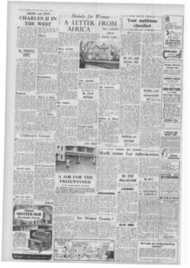Page 8, 3rd June 1960
Page 8

Report an error
Noticed an error on this page?If you've noticed an error in this article please click here to report it.
Tags
Share
Related articles
Congolese Priest Shot By Tribesmen
African Bishop Forced To Flee
Independence In Four Months
Protest At Arrest Of Bishops
Logic Is Not His Strong Point
LATERAN Why the Baluba fear the Lulua
THE Church may find itself caught in the middle of a civil war when, in under a month's time, the Belgian Congo becomes independent on June 30. That is the opinion of a 50year-old Scheut Father who is now working at his congregation's headquarters in the U.S.A. after serving for 18 years in the Congo.
He is Fr. Joseph Vande Welle, C.I.C.M., who, before his ordination in 1942, was the first European seminarian to study at the previously all-African seminary in Kabwe.
The main hope for the future welfare of the Church in the Congo is the development of a sufficient number of African priests and bishops, said Fr. Vande Welle, who described the present African clergy-558 priests and six bishops, if Ruanda-Urundi is included with the Congo—as " well screened and well trained ".
But "in numbers they are not sufficient " to serve the Congo's present Catholic population of over 6,800,000.
Loyalty
1 he African clergy of the Congo, he commented, " are also —and very much so—children of their tribes, and that is the great danger for the Church in the Congo ". Deep-seated loyalties to their tribes may put the African clergy in an untenable position if real civil war breaks out there.
As has been widely reported in the secular press, violence has flared up several times since last December between the Lulua and Baluba in and around Luluabourg, the archdiocese where Fr. Vande Wells was at one time director of the minor seminary.
Formerly, he explained, the Lulua were the rulers of the country and the Baluba were their servants; but when the Europeans coloaised the country the Baluba accepted Western civilisation, sent their children to the white men's schools, and settled down as owners of the land they had once tilled for the Lulua.
Now that independence is at hand and the Europeans are withdrawing from the country, the Lam are preparing to seek to regain power by violence.
For the Church, this explosive situation is complicated by the fact that most of the African clergy in the district are Baluba. and Catholic Lulua are hostile towards the Baluba priests.
Fears
Some Lulua would not dare even to receive Holy Communion from the hands of Baluba priests for fear of being poisoned by their own tribesmen, said Fr. Vande
Welle. " Fear of intertribal revenge is deeply imbedded in their hearts," he added. " Parishes founded among the Balubi in Lulua territory are now deserted and waiting for new Lulua Catholics."
However, the prospects are brighter for the Church in the Congo than for the civil administration, since the Catholic Hierarchy and clergy are well educated, whereas there is a serious shortage of trained African administrators and technicians to run the country.
This shortage Fr. Vande Welle blames on the fact that secondary and higher education in the Congo has been developed only since the end of the last war. One of the most encouraging factors in the educational picture, he said, was the Catholic University of Lovanium at Ldpoldville, which has 500 students enrolled for the academic year 1959-60.
Chaos may overwhelm the Congo immediately after it achieves independence, he warned. But, sooner or later, " the best elements in the Congo will have a chance to take up their responsibilities".
blog comments powered by Disqus









